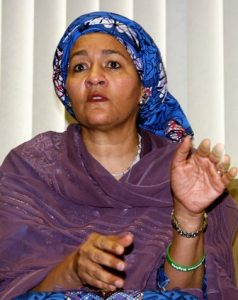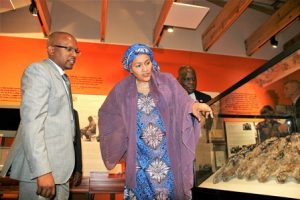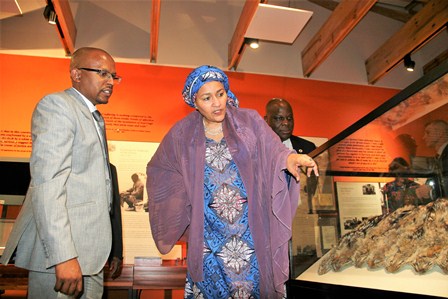
The 5th Deputy Secretary-General of the United Nations, and eldest of five daughters of a Nigerian veterinarian-herdsman and a British nurse – the 56 year old’s resume points to a meteoric rise in a career which has had her serving her country of birth as a Minister of Environment and a Special Adviser to UN Secretary-General Ban Ki-moon – among a list of big-hitting occupations!
Only in her current UN post since February of this year, the Nigerian Women’s Hall of Famer was given a tour of the Nelson Mandela Centre of Memory after a pre-lecture press conference in Lower Houghton, on the eve of her address in the Mother City.
In Cape Town, she titled her speech: CENTERING GENDER: REDUCING INEQUALITY THROUGH INCLUSION AND SUSTAINABILITY.
Opening her address by thanking the Nelson Mandela Foundation’s Board of Trustees for choosing to add her to the list of hallowed speakers, such as Microsoft’s William Gates, who have delivered the preceding 14 lectures – Mohammed expressed the feeling of honour for being here this year, as we approach the centenary commemoration of Nelson Mandela’s birth in 2018.
She spoke of how her feelings for Madiba were deep and shared across this country, this continent and our world.
“We all stand today on his shoulders, with a shared sense of respect, admiration and pride for the feat that he accomplished,” she offered, whilst continuing that as a young girl growing up in north-eastern Nigeria, she was proud of her country’s contributions to the liberation struggle in South Africa.
Pointing out that to reach across borders was to transcend differences – she also went on to mention that multilateralism, peace, development and human rights were all threatened by a leadership vacuum across the globe.
Also a businesswoman who previously served three Nigerian presidents over a period of six years, Mohammed recalled how as a young girl, her earliest memory of the liberation struggle was when at the tender age of 11, she asked her father if the family could visit South Africa, and he sighed, and pointed out how it would had been impossible for a family of mixed heritage, such as theirs – to could had seen that come to pass.
“Why not? I wanted to know. He tried to explain the unexplainable; that as it was constituted, a black father, white mother we would be breaking the law,” she remembered.
She noted that in apartheid South Africa, her family would have been segregated – mother, father, and child by race.
“The unbending courage and conviction of Nelson Mandela, his leadership and his comrades kept the world full of hope. Mandela towered but he was the first to say he was not a perfect human. He noted that he was concerned that he not be regarded as a saint, for only God is perfect. Nelson Mandela was unrelentingly stubborn where it counted: in fighting for justice and equality,” Mohammed continued.
Speaking about the issue of centering gender, and reducing inequality through inclusion and sustainability provided an opportunity for her to address what remains perhaps the most pervasive inequality globally, in every country and every society – that of gender inequality, she emphasised.
She drew attention to the fact that we are presently witnessing a global movement, building momentum to say no more will violence against half the World’s population (our mothers, our sisters, our daughters) be invisible or, worse still, treated with indifference.
“Madiba was courage, even when in his darkest moments he thought he may not have any to give.
His moral courage was defined in his DNA. He would never compromise his convictions even at the cost of his freedom,” Mohammed spoke on.
Thanking some hosts for granting her a personal tour of Robben Island, she inferred that the Constitution of South Africa was a shining example of turning the most brutal lessons of a bloody history into the most humane protections of a rights-based ideal.
The former Adjunct Professor for the Master’s in Development Practice program at Columbia University, went on to say that the United Nations was proud to have benefited from the wise counsel and active contributions of a number of sons and daughters of this great nation – referring to South Africa.
“This includes my colleague, the outstanding head of UN Women, Phumzile Mlambo-Ngcuka, who I am proud to call a sister, a friend and a mentor. I know that she is saddened to not be here with us today,” she declared.
In the momentum of her address, Mohammed mentioned the likes of Charlotte Maxeke, Lillian Ngoyi, Albertina Sisulu, Gertrude Shope, Ruth First, Fatima Meer, Adelaide Tambo, Emma Mashinini, Winnie Madikizela-Mandela, Sophie de Bruyn, Helen Suzman and Mamphela Ramphele to show how South African women have been at the vanguard of change globally.
She offered that the mid-1950s march by some 20 000 women of this country to protest the pass laws under the powerful slogan of: You Strike a Woman, You Strike a Rock – was a turning point in the struggle against apartheid.
“South Africa women”, she suggested, “have been leaders for change.”
A onetime Senior Special Assistant to the President of Nigeria on the Millennium Development Goals, she said that gender equality was central to Madiba’s vision of equality, and central to the struggle for freedom.
“This was the result of women’s tireless mobilisation. Nelson Mandela taught that freedom is indivisible, noting that the chains on any one of my people were the chains on all of them; the chains on all of my people were the chains on me.
Speaking before the first Parliament in 1994, he declared that freedom cannot be achieved unless the women have been emancipated from all forms of oppression,” she added.
Mohammed also drew attention to a report issued recently by the World Economic Forum that it would take 217 years to equalise the pay and employment opportunities of men and women.
She said that women’s equal participation in the labour force would unlock $12-trillion in global growth, and that that money could be used to further access to education, health and services for all, not just for women – for all!
She offered that there was evidence that one of the greatest predictors of stability and resilience to conflict is levels of gender equality in a society.
Pointing out that as UN Deputy Secretary-General, she recently received some teenage visitors and had a dialogue with a young girl named Ekhlas Bajoo, a Yazidi woman who was captured and held by Daesh – Mohammed said that she was deeply moved by her plight but was struck by her powerful voice for justice.
Pending the engagement, Mohammed recalled a moment when, Hauwa Mohammed, victimised by Boko Haram and a lone face out of the thousands of girls, like the Chibok girls, who have suffered as a result of the terrorism in her own country, Nigeria – embraced a young woman from Iraq instantly, despite being total strangers who spoke different languages.
“They easily communicated messages to each other. They said, don’t give up hope. Let us win over the terrorists. Let us reach across the divisions. Let us build a better world,” she recalled.
Once in charge of coordinating Nigeria’s debt relief funds toward the achievement of its Millennium Development Goals, she claimed that socially, environmentally and politically, women have proven that when you invest in them, you got results for all – with the question being how to build on those gains and achieving true gender equality.
“Dear friends, I have skirted the surface of the huge challenges that we face today and I believe from Cape Town and its drought to the lost opportunity of South Sudan and its hard-won independence, to the Sahel and its battle with terrorism, human slavery and drug trafficking, to Myanmar and the ethnic cleansing we are witnessing, to femicide in Latin America, wars in middle USA, to migration and the refugee crises in Europe, our global village is truly in a mess,” she added.
Going on to mention former Mozambican first lady and Mandela’s widow, Mama Graca Machel, who served as one of the eminent Sustainable Development Goal advocates and in addition to being a member of the High-level Panel on the post-2015 Agenda – she hinted that we owed a great debt of gratitude to a wonderful lady , such as she is.

“The 2030 Agenda,” she went on, “constitutes a universal plan of action for ending poverty and ensuring a life of dignity for all.”
A coordinator of the Task Force on Gender and Education for the UN Millennium Project between the years, 2002-2005, Mohammed acknowledged that the framework builds on many successes since the 1995 Fourth World Conference on Women in Beijing, where about two-thirds of countries in developing regions have gender parity in primary education; fewer women die in childbirth, and more girls survive past childhood.
She challenged the audience by offering that she’d like to leave them all with a call to action: to invest in the missing 50% of our human asset base – so as to make good on the new era of the Sustainable Development Goals.
“My promise to you as woman of colour, a Muslim, a proud mother of six and a grandmother of one in a position of privileged responsibility serving alongside Antonio Guterres, to strive to leave the UN fit for the purpose of healing our world and ensuring we keep hope alive for those who deserve a life of respect and dignity.
In the UN, I am very proud that our Secretary-General Guterres, speaks out at every opportunity against misogynist mindsets. He is working for gender equality within the UN and around the world,” she carried on.
The native of Gombe State- pointed out that gender is not equal to women, as gender inequality, norms, and stereotypes affected men and women, girls and boys – adding that she was struck by the number of men who spoke of the need for gender inequality not to dispossess or disempower men.
Guteress’ right-hand lady also offered that the #MeToo movement was opening new conversations, in some cases frightening, establishing new shared understandings of unacceptable behaviour, and shedding new light on the pervasive nature of gender inequality, as did the He4She campaign.
“Friends, ladies and gentlemen, Nelson Mandela had a very long walk to freedom. Most of us could not even fathom this journey. Madiba showed tremendous integrity in stepping off the platform when the applause was loudest. Unfortunately he didn’t infect many with that virus as he left. We should be inspired by his necessarily long walk and make a fast run to gender equality.
We need to galvanise the international community, which includes us all, to invest in women and girls and to give them space so they can contribute to progress,” she carried on.
Pointing out that she was perhaps the first person to deliver this lecture who never met Nelson Mandela – Mohammed added that in a sense, she represent generations of people to come who will take inspiration from his life without ever having had the privilege of a personal encounter.
“However, I believe I learned a little of who he was through a great woman of Mozambique and South Africa: his wife, his better half, his best friend, Graca Machel. She embodies the same vast courage as her late husband, the same inspiring passion to raising a new generation of girls and the same immense spirit of humanity.
A rare woman of substance who just tells it like it is. I feel, if we feel defeated, we can return to Madiba’s indomitable bravery and humanism. Nelson Mandela possessed a character that none of us could emulate but we can all be inspired to try,” Mohammed concluded to rapturous applause.

